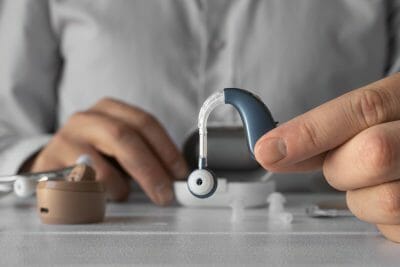Choosing a hearing aid is no more a tough job today. Earlier, traditional hearing aids used to look and feel bulky, which is why so many people shied away from them.
But now, you can easily purchase one that not only looks stylish but is also simple to use. In fact, more than 14% of adults over 65 use a hearing aid.
So, if you or someone close plans to get a hearing device that fits your lifestyle, here are some basic criteria to consider!
- Consult a professional first
Even before you start picking out the perfect hearing aid, it’s important to first speak to a doctor. You must consult a specialist if you experience hearing loss and pain or numbness in at least one ear.
But if the hearing loss is simply due to age, you can directly book a consultation with an audiologist.
Even hearing instrument specialists will be able to diagnose the problem and tell you what kind of hearing aid will be ideal for your lifestyle.
- Check the hearing aid styles
If you study the market of hearing aids, you will always find a varied range of different devices, each based on your preferences. However, the Completely In-Canal or CIC hearing aid is the most common type. It is molded in a way such that it snugly fits inside the ear canal.
People tend to go for CIC hearing aids because they look tiny and are the least visible. Moreover, they even use small batteries.
In-the-canal or ITC aids are also quite popular, but the earwax inside can clog the speakers.
Behind-the-ear or BTE aids have a hook that loops over the top and fits behind the ear. Even though they come with a rechargeable battery, they can pick up wind more than other hearing aids.
- Consider the smartphone capability
If you frequently use your smartphone, then you must consider pairing it with your hearing device.
Many high-tech hearing aids are equipped with Bluetooth connectivity. Once your device is paired, you can easily enjoy music, use it for calls, and do a lot more through the hearing aids.
However, the biggest disadvantage of these Bluetooth-enabled hearing aids is that they consume a lot of power.
Therefore, look for ones that have Bluetooth Low Energy (BLE) mentioned. This feature might not completely eliminate your problem, but it will reduce battery consumption.
- Look at the noise-cancellation features
Many hearing aids also come with noise cancellation features, similar to those of a headphone. Elderly people prefer going for noise-cancellation hearing aids to hear better since it gives more clarity to the speakers.
Noise cancellation can come in the form of background noise cancellation, such as the sounds of car horns or others talking in the background. It might also be enabled with wind cancellation techniques that significantly reduce sounds made by winds gusting.
If winds and rain are common in your residential area, this will be the ideal hearing aid for you.
- Try out health monitoring apps
Just like many hearing devices can help you to connect to important updates on your smartphone, others can give you real-time updates about your health and how to monitor different aspects.
These equipments are enabled with artificial intelligence or AI that automatically calls a loved one or calls emergency services when you need help.
These special hearing aids, called Healthables, will give you high-quality data that you can carefully monitor to improve your lifestyle.
- Give it some time
Even if you purchase the best hearing aid on the market, you’re bound to feel strange and uncomfortable in the first few days.
The trick is to give yourself some time to get accustomed to the device. Your ears, too, have to adjust to the right level of frequency and amplitude.
Any hearing aid tends to amplify natural sounds, so you might hear them a little louder than usual. But after a while, your brain will train itself to become comfortable with the ambient noises.
Over to you
These are a few of the most important things you must consider before going for the perfect hearing aid. So don’t wait anymore and make your purchase today!
